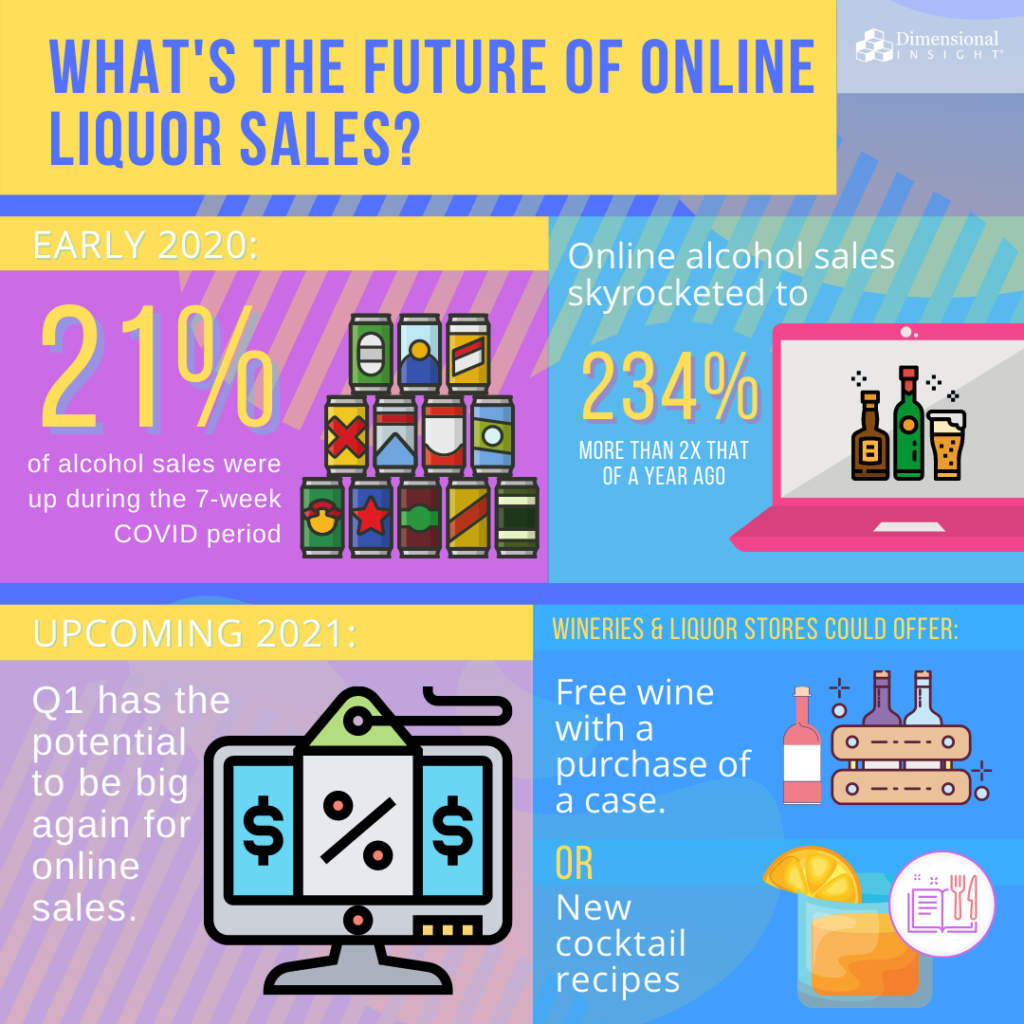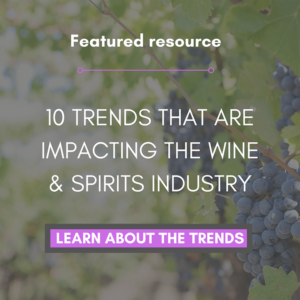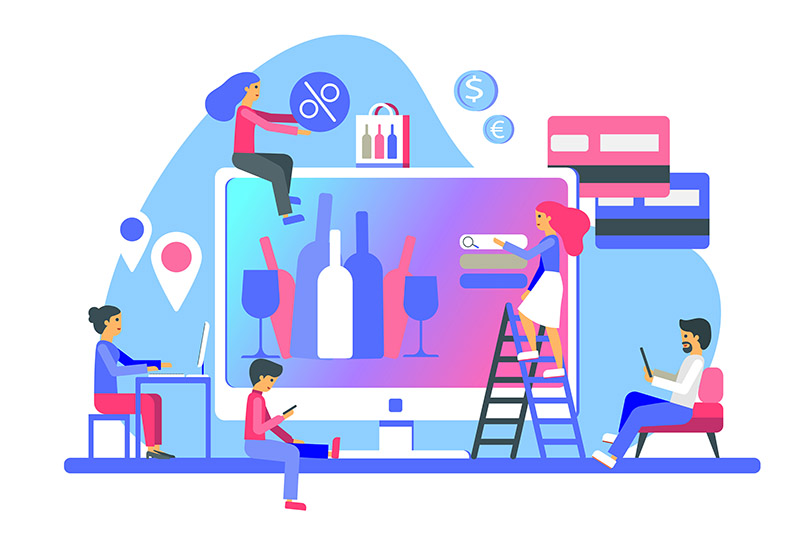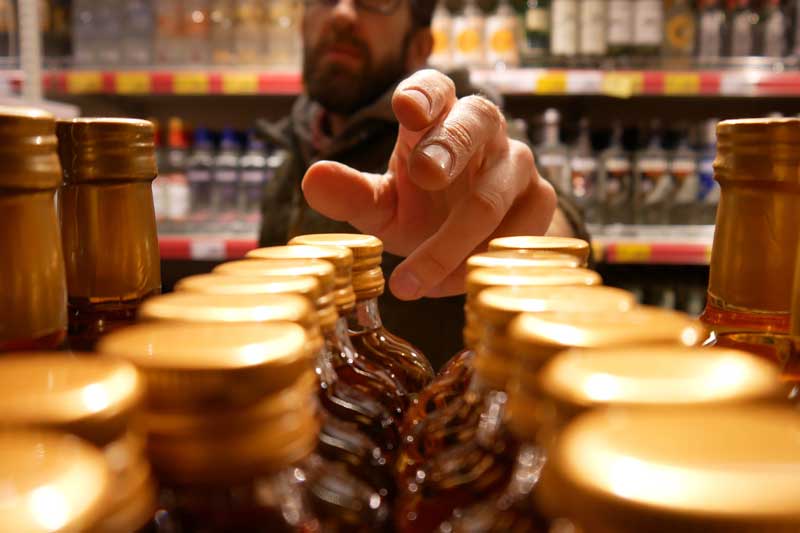For most of 2020, Americans lived in a flux of stay-at-home orders due to the COVID-19 pandemic. Many filled their days with homemade cocktails and Zoom happy hours with family and friends when there was not much to do.
In fact, Americans drank more than ever this year — from home — and wanted their alcohol delivered to their front door. Many states slashed laws that prohibited online sales or alcohol delivery, allowing for a new way of selling wine and spirits.
Online liquor sales by the numbers
In the early days of the pandemic, online alcoholic beverage sales increased 387% for the week ending April 11, according to CNN. The week prior, sales were up a staggering 441%.
According to Nielsen, during the seven-week COVID-impacted period that ended April 18, 2020, brick-and-mortar alcohol dollar sales were up 21%, while online alcohol sales skyrocketed to more than twice that of a year ago at that time, up 234%.
“Internet sales show as the most important channel for wineries. Telephone sales are gaining importance and of course Zoom sales as well,” Rob McMillan, the executive vice president and founder of the Silicon Valley Bank Wine Division, told Forbes.
Drizly, the on-demand alcohol delivery app that partners with liquor stores, predicts this holiday season will see a 44% increase compared to years prior, according to an internal Drizly report. The same report found 70% of independent retailers surveyed experienced higher in-store sales since COVID-19 became widespread, while 78% saw online sales increase.

The future of liquor laws
“The State Liquor Authority is going to change its rules that will allow bars, restaurants, and distilleries to sell their products off-premises,” New York Governor Andrew Cuomo said in mid-March.
Florida’s Republican Governor, Ron DeSantis, changed his state’s rules in May, too. “I allowed [bars and restaurants] to deliver alcohol, I think that’s been pretty popular; we’re probably going to keep that going,” he told reporters.
Some states initially enacted these changes as a temporary measure. Still, with so many restaurants and small businesses struggling, any added benefit to help the economy will be welcomed, and consumers will demand the convenience.
What does this mean for 2021?
While online sales had a banner year in 2020, 2021 may tell a different story once more Americans receive the COVID-19 vaccine.
 “Consumers are spending significantly less on alcohol because of the closures and restrictions to the on-premise space,” Danny Brager, senior vice president of beverage alcohol at Nielsen, told Forbes. “People are just transferring their purchases, not buying more alcohol in total.”
“Consumers are spending significantly less on alcohol because of the closures and restrictions to the on-premise space,” Danny Brager, senior vice president of beverage alcohol at Nielsen, told Forbes. “People are just transferring their purchases, not buying more alcohol in total.”
While more wineries, restaurants, and bars should be open in 2021 with fewer restrictions as the year goes on, the first quarter of 2021 may have stay-at-home orders that mirror March and April 2020. This means Q1 has the potential to be big again for online sales.
Typically, liquor sales decrease after the holidays, but anything goes after the way 2020 shook out. Wineries and liquor stores should employ some winter marketing ideas, such as promotions offering a free bottle when a customer purchases a case of wine, or tout new cocktail recipes to keep online and delivery sales booming.
“Online sales represent an opportunity for the on-premise channel too. The last few weeks have seen retailers and operators become more sophisticated in their approach to restaurant takeout and delivery options,” Nielsen wrote in a report. “As a result, consumer adoption is rising. In fact, a growing number of consumers claim to be ordering alcohol with their takeout from restaurants (14% of U.S. consumers in the week ended April 25, up from 9% in the previous two weeks). And among consumers who have ordered alcohol with takeout/delivery or would consider doing so, about half would consider ordering a cocktail kit or premade cocktail.”
- 87% of Utilities Have Experienced at Least One Data Breach in Last Three Years - February 5, 2024
- Can Drones Lower Your Next Utility Bill? - January 10, 2024
- Onshore Wind Farms Are The Next Big Thing In Renewable Energy - December 6, 2023



